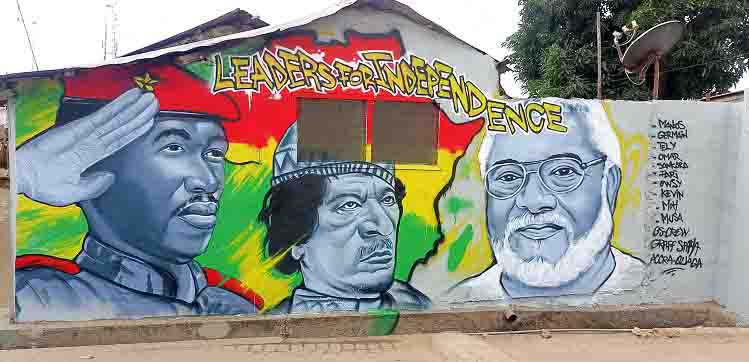The Youth for Peace and Security-Africa (YPS-Africa), a Pan-African organization, the Citizens Network for Peace and Security in Africa, and an anonymous artist have jointly honored three African revolutionary leaders for their contribution to Africa’s development.
The three African revolutionary leaders are the late former President Jerry John Rawlings of Ghana, the late former President Captain Thomas Sankara of Burkina Faso, and former Libyan President Muammar Gaddafi.
Mr. Abraham Korbla Klutsey, the Executive Director of YPS-Africa, on behalf of the others, unveiled an artistic expression located at a strategic Centre at Nima in Accra on Tuesday and paid homage to three iconic revolutionary African leaders.
“As the world changes and new challenges emerge, the lessons from the leadership of Rawlings, Sankara, and Gaddafi remain relevant and inspirational,” he stated.
He said the mural depicts the late former President Rawlings, the late former President Sankara, and former Libyan President Gaddafi.
He described the unveiling as a moment of reflection on the life and legacy of these great men of value.
“The honor is to celebrate their heroic and revolutionary leadership that not only liberated their respective nations, but also inspired countless Africans across the continent, he explained at the impressive ceremony.
He said the painting, which stands as a testament to the enduring legacy of these leaders, was created by an anonymous Pan-Africanist who felt compelled to honor their contributions to Africa’s development and the upliftment of the poor.
“These leaders were more than just presidents; they were symbols of hope, resilience, and a vision for a self-sufficient Africa,” Mr. Klutsey quoted the anonymous artist.
He said the vivid and powerful imagery in the graffiti captures the essence of their leadership, courage, and dedication to the cause of African unity and progress.
Mr. Klutsey, who is also Executive Director for Citizens Network for Peace and Security in Africa, explained that Youth for Peace and Security-Africa, which is a Pan-African organization is dedicated to promoting peace, security, human rights, and development across the continent.
He said the organization has taken the initiative to organize an event to officially unveil and honor the graffiti.
“We believe that it is essential for the younger generation to remember and be inspired by the revolutionary leaders who fought for the freedom and prosperity of Africa,” said Mr. Klutsey.
Mr. Klutsey said the event led by Youth for Peace and Security-Africa is not just an unveiling of a mural but a call to the youth of Africa to remember the ideals these leaders stood for and to continue the fight for a united, prosperous, and peaceful continent.
A brief profile of the three iconic revolutionary African leaders shows that former President Jerry John Rawlings (1947–2020) was Ghana’s charismatic leader, remembered for his revolutionary approach to governance.
Initially coming to power through a coup in 1979, Rawlings handed power to a civilian government before returning in 1981 to lead the country through a period of economic reform and stability.
His commitment to social justice, anti-corruption, and the empowerment of the underprivileged earned him the admiration of many Ghanaians. Rawlings’ leadership is credited with laying the foundation for Ghana’s democratic development and economic growth.
Thomas Sankara (1949–1987), often referred to as “Africa’s Che Guevara,” was the revolutionary leader of Burkina Faso from 1983 until his assassination in 1987.
Sankara’s vision for his country was one of self-reliance, anti-imperialism, and radical social reforms.
He implemented policies aimed at improving education, public health, and women’s rights and was a staunch advocate environmental protection.
Despite his short tenure, Sankara’s legacy as a leader who sought to empower his people and break the chains of colonialism remains deeply influential across Africa.
Muammar Gaddafi (1942-2011): As the leader of Libya from 1969 until his death in 2011, he was a polarizing figure whose revolutionary ideas extended far beyond his country’s borders.
Gaddafi’s vision of a united Africa, free from Western influence, resonated with many Pan-Africanists.
His Green Book outlined his ideas for a form of direct democracy and economic independence.
Although his rule was marked by controversy and conflict, Gaddafi’s contributions to Africa, including his support for liberation movements and his efforts to create a United States of Africa, are recognized as part of his complex legacy.
Source: GNA


